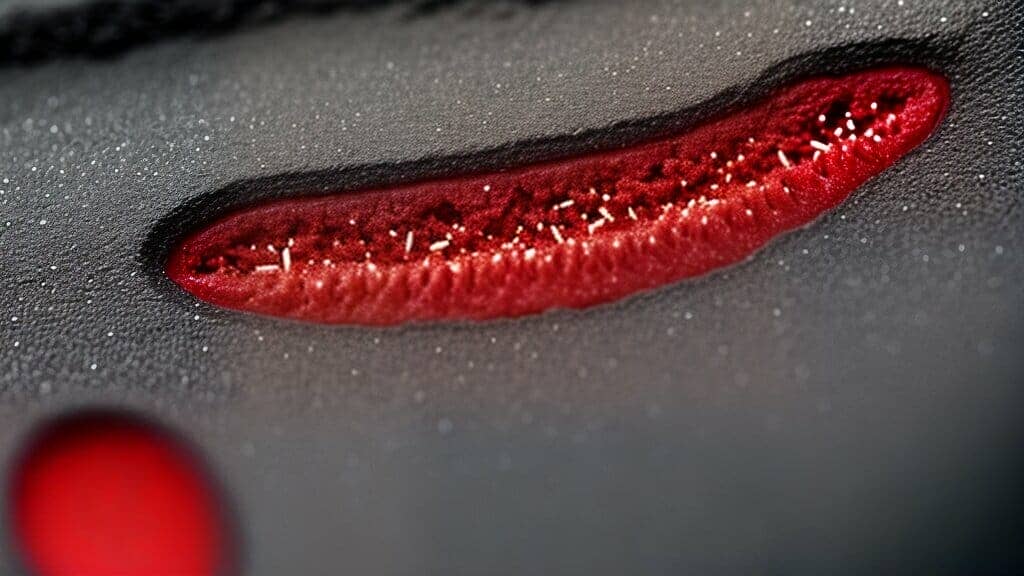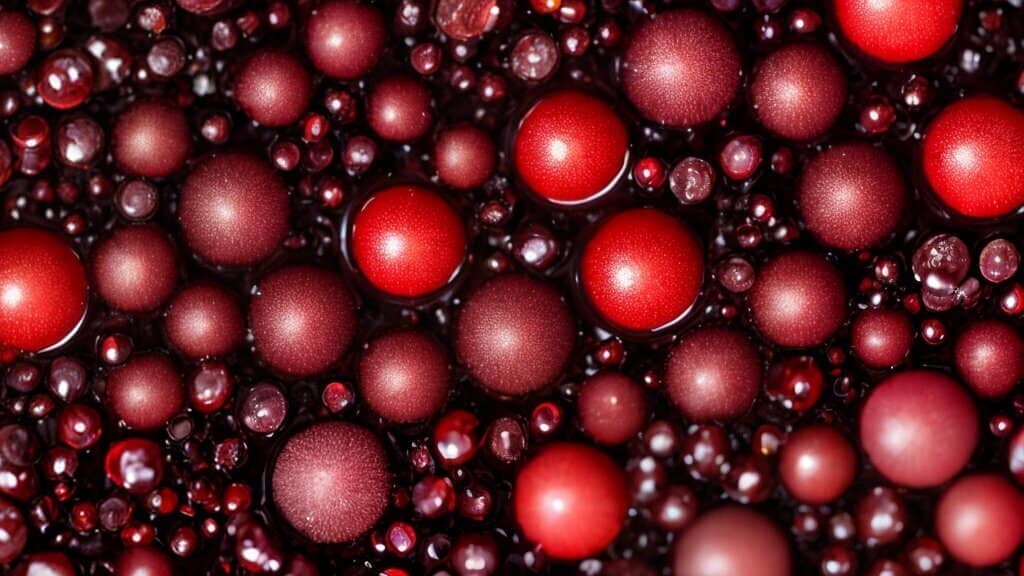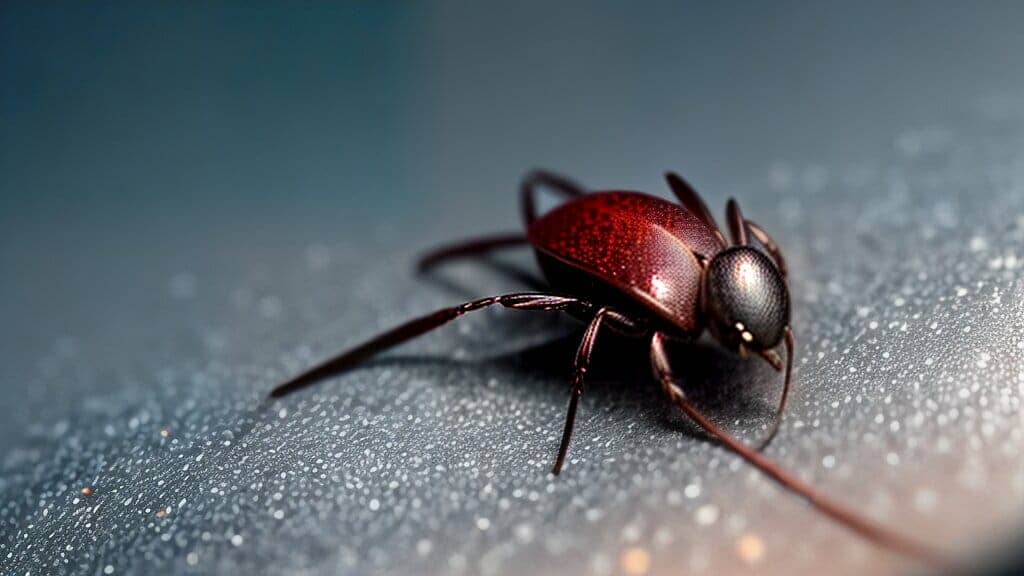Lyme Disease and blood disorders are two distinct medical conditions that can have a significant impact on a person’s health and well-being. While Lyme Disease is a tick-borne illness caused by the bacterium Borrelia burgdorferi, blood disorders are a group of conditions that affect the production and function of blood cells.
Despite their differences, there is a connection between Lyme Disease and blood disorders. Lyme Disease can affect the blood, leading to the development of various blood-related conditions. These conditions can be serious, affecting a person’s ability to fight infections, control bleeding, and transport oxygen throughout the body.
Understanding the symptoms, causes, and available treatments for Lyme Disease and blood disorders is essential for effective management and recovery. In this article, we will explore these topics in-depth and provide insights on diagnosis, treatment, and lifestyle management.
Key Takeaways:
- Lyme Disease and blood disorders are two distinct medical conditions.
- There is a connection between Lyme Disease and blood disorders.
- Understanding the symptoms, causes, and available treatments for these conditions is essential.
Understanding Lyme Disease
Lyme Disease is a tick-borne illness caused by the bacterium Borrelia burgdorferi. It is transmitted to humans through the bite of infected black-legged ticks, also known as deer ticks, and western black-legged ticks. Lyme Disease is prevalent in the United States, with the majority of cases reported in the Northeast, upper Midwest, and Pacific Coast regions.
The early symptoms of Lyme Disease resemble flu-like symptoms, including fever, headache, fatigue, and muscle and joint pain. However, if left untreated, the disease can progress to more severe symptoms, such as arthritis, neurological complications, and heart problems. Early detection and treatment are crucial in preventing the onset of these more serious symptoms.
Diagnosis of Lyme Disease is typically based on clinical symptoms, such as the presence of characteristic rashes and a history of tick exposure, in addition to laboratory confirmation through blood tests and other diagnostic procedures. Treatment for Lyme Disease usually involves a course of antibiotics, although the specific medication and duration of treatment may vary depending on the individual’s symptoms and medical history.
Prevention measures for Lyme Disease include wearing protective clothing when outdoors, applying insect repellant containing DEET, performing frequent tick checks, and avoiding areas with high tick populations. Understanding the causes and symptoms of Lyme Disease is essential in preventing and managing the condition.

Blood Disorders: An Overview
Blood disorders, also known as hematological disorders, refer to conditions that affect the production, function, or lifespan of blood cells and components. These disorders can be either acquired or inherited, and they can range from benign to life-threatening.
Symptoms of blood disorders can vary depending on the specific condition but may include fatigue, weakness, shortness of breath, dizziness, abnormal bleeding or bruising, and increased risk of infection. Diagnosis typically involves blood tests, bone marrow biopsies, and imaging tests such as CT scans or MRIs.
Treatment options for blood disorders depend on the type and severity of the condition. They may include medications such as antibiotics, steroids, or chemotherapy, blood transfusions, bone marrow transplants, or surgical procedures.

It is important to properly diagnose and manage blood disorders to prevent complications and improve outcomes. Close monitoring of blood counts and other indicators can help detect and manage complications early on.
At Oasis Medical Institute, a comprehensive approach is taken in the diagnosis and treatment of blood disorders. Medical director Dr. Francisco Contreras MD leads a team of specialists who can provide personalized treatment plans tailored to each patient’s needs.
The Connection between Lyme Disease and Blood Disorders
Lyme Disease is a tick-borne illness that can affect various parts of the body, including the blood. As a result, individuals with Lyme Disease may be at increased risk of developing blood disorders. According to research, Lyme Disease can cause changes in blood cell counts, such as a decrease in red blood cells, white blood cells, and platelets. These changes can lead to the development of hematological disorders, including anemia, thrombocytopenia, and leukopenia.
The exact mechanisms by which Lyme Disease affects the blood are still under investigation. However, it is believed that the bacteria responsible for Lyme Disease can infect and damage blood cells, as well as trigger an immune response that affects blood cell production and survival. Additionally, Lyme Disease can cause inflammation and dysfunction of the blood vessels, further contributing to the development of blood disorders.
It is essential for healthcare providers to consider the possibility of blood disorders in individuals with Lyme Disease, as these conditions may require specific diagnostic and treatment approaches. The symptoms of blood disorders, such as fatigue, weakness, and bleeding, can overlap with those of Lyme Disease, making it challenging to distinguish between the two. However, proper diagnosis and management are crucial in promoting optimal health outcomes.

How Are Blood Disorders Treated in Individuals with Lyme Disease?
The treatment of blood disorders in individuals with Lyme Disease will depend on the specific condition and its underlying causes. In some cases, such as mild anemia or thrombocytopenia, supportive measures such as iron supplementation or platelet transfusions may be sufficient. However, in more severe cases or those that do not respond to standard therapies, more aggressive treatments may be necessary, including chemotherapy, immunotherapy, or bone marrow transplantation.
It is important for individuals with Lyme Disease and blood disorders to receive comprehensive and individualized care, addressing both the Lyme Disease and the associated hematological condition. Holistic treatment approaches, such as those offered at Oasis Medical Institute, can be particularly beneficial in addressing both physical and emotional aspects of these complex conditions.
Diagnosing Lyme Disease and Blood Disorders
Accurate diagnosis is key to effective treatment of Lyme Disease and blood disorders. Diagnosis involves a combination of medical history, physical examination, and laboratory tests.
For Lyme Disease, two-step testing is recommended by the Centers for Disease Control and Prevention (CDC). The first test is an enzyme immunoassay (EIA) or immunofluorescence assay (IFA) to detect antibodies to the bacteria that causes Lyme Disease. The second test is a Western blot to confirm the results of the first test. It is important to note that false negative results can occur in the early stages of the disease, so a negative test result does not necessarily rule out Lyme Disease.
Blood disorders are diagnosed through a variety of tests, including complete blood count (CBC), blood smear, and bone marrow biopsy. A CBC measures the number and types of blood cells in the body, while a blood smear looks at the appearance of blood cells under a microscope. A bone marrow biopsy involves taking a small sample of bone marrow tissue for examination.
Diagnosing Lyme Disease and Blood Disorders at Oasis Medical Institute
Oasis Medical Institute offers comprehensive diagnostic services for Lyme Disease and blood disorders. Medical director Dr. Francisco Contreras MD and his team conduct a thorough evaluation of each patient’s medical history, symptoms, and laboratory results to develop an accurate diagnosis and individualized treatment plan.
Diagnostic testing at Oasis Medical Institute may include advanced laboratory tests such as PCR testing, which can detect the DNA of the bacteria that causes Lyme Disease, as well as flow cytometry, which can identify abnormal cells in the blood and bone marrow.

“Early and accurate diagnosis is crucial to the successful treatment of Lyme Disease and blood disorders.”
With a focus on integrative medicine and cutting-edge diagnostic tools, Oasis Medical Institute provides patients with a comprehensive approach to Lyme Disease and blood disorders treatment.
Treatment Options for Lyme Disease
Lyme Disease can be a challenging condition to manage, requiring a multifaceted treatment approach to achieve optimal results. Several conventional medical treatments are available for Lyme Disease, including antibiotics, antifungal medications, and anti-inflammatory drugs. However, these treatments may not be effective for all individuals and may have unwanted side effects.
Many individuals with Lyme Disease turn to alternative therapies to complement their conventional treatment. These therapies include herbal supplements, acupuncture, chiropractic care, and energy medicine. Alternative therapies can help alleviate symptoms, improve energy levels, and enhance overall well-being. They can also provide relief for individuals who have not responded to conventional treatments.
At Oasis Medical Institute, a holistic approach is taken to Lyme Disease treatment. Medical director Dr. Francisco Contreras MD and his team of experts use a range of integrative therapies to support the body’s natural healing processes. These therapies include ozone therapy, intravenous vitamin C therapy, and hyperthermia. By addressing the root causes of Lyme Disease, these treatments can provide lasting relief and improve quality of life.
Conventional Medical Treatments for Lyme Disease
Conventional medical treatments for Lyme Disease typically involve the use of antibiotics or antifungal medications to eradicate the Borrelia burgdorferi bacteria that causes the disease. These treatments may also include anti-inflammatory drugs to reduce inflammation and relieve pain. Antibiotics are usually administered orally, but intravenous antibiotics may be required for individuals with more severe cases of Lyme Disease. While antibiotics can be effective in treating Lyme Disease, they can also have side effects and may not be suitable for everyone.
It is also important to note that antibiotics alone may not be sufficient for treating Lyme Disease. The bacteria can be resilient and may persist despite antibiotic treatment. As a result, alternative therapies and lifestyle modifications may be necessary to support the body’s natural immune response and promote healing.
Alternative Therapies for Lyme Disease
Alternative therapies can complement conventional medical treatments for Lyme Disease and offer additional benefits. These therapies can help alleviate symptoms, improve energy levels, and promote overall healing. Some of the most popular alternative therapies for Lyme Disease include herbal supplements, acupuncture, chiropractic care, and energy medicine.
Herbal supplements such as turmeric, garlic, and ginger can help reduce inflammation, boost the immune system, and relieve pain. Acupuncture can relieve pain and improve energy levels by restoring the flow of energy throughout the body. Chiropractic care can help alleviate joint pain and improve mobility. Energy medicine, such as Reiki, can help promote relaxation, reduce stress, and improve overall well-being.
Holistic Treatment at Oasis Medical Institute

“Holistic medicine is the art and science of healing that addresses the whole person – body, mind, and spirit.” – Dr. Francisco Contreras
At Oasis Medical Institute, a holistic approach is taken to Lyme Disease treatment. Medical director Dr. Francisco Contreras MD and his team of experts use a range of integrative therapies to support the body’s natural healing processes. These therapies include ozone therapy, intravenous vitamin C therapy, and hyperthermia. By addressing the root causes of Lyme Disease, these treatments can provide lasting relief and improve quality of life.
Ozone therapy involves the use of medical-grade ozone to stimulate the immune system and reduce inflammation. Intravenous vitamin C therapy delivers high doses of vitamin C to the body, which can help boost the immune system and promote healing. Hyperthermia involves exposing the body to high temperatures to stimulate immune function and reduce inflammation.
At Oasis Medical Institute, each treatment plan is tailored to the individual needs of the patient. Dr. Francisco Contreras MD and his team work closely with patients to develop a comprehensive treatment plan that includes both conventional and alternative therapies. By taking a personalized approach to treatment, Oasis Medical Institute provides the best possible care for individuals with Lyme Disease.
Holistic Treatments at Oasis Medical Institute
In the pursuit of effective Lyme Disease treatment, Oasis Medical Institute in Tijuana, MX offers a holistic approach led by medical director Dr. Francisco Contreras MD. With over 40 years of experience, Dr. Contreras and his team are experts in addressing Lyme Disease and blood disorders, offering individualized treatment plans that integrate conventional medical treatments and alternative therapies.
At Oasis Medical Institute, patients receive comprehensive diagnostic testing and evaluations to identify the underlying causes of their condition. Treatment plans may include a combination of nutritional therapy, immune system support, detoxification, and other integrative therapies.
In addition to traditional medical treatments, Oasis Medical Institute offers supportive therapies such as acupuncture, massage therapy, and psychological counseling to help manage symptoms and promote overall well-being during the recovery process.
With a focus on whole-person care and a commitment to individualized treatment plans, Oasis Medical Institute offers a unique approach to Lyme Disease and blood disorder treatment. Contact them at 866-868-1992 to schedule a consultation with Dr. Contreras and his team to learn more about their integrative approach to health and wellness.

The Role of Nutrition and Lifestyle in Managing Lyme Disease and Blood Disorders
While medical treatment is crucial for Lyme Disease and blood disorders, nutrition and lifestyle factors can also play a significant role in managing these conditions. A healthy diet and regular exercise can promote overall well-being and support the body’s natural healing processes. Nutritional supplements may also help address specific deficiencies and support the immune system.
In addition to diet and exercise, stress management techniques such as meditation or yoga may help reduce symptoms and improve quality of life. It is also important to avoid exposure to toxins and other environmental triggers that can worsen symptoms.
Furthermore, consulting with a healthcare practitioner experienced in treating Lyme Disease and blood disorders can help create a tailored treatment plan that includes lifestyle modifications for long-term relief and management of symptoms.
The expert team at Oasis Medical Institute, led by medical director Dr. Francisco Contreras MD, offers a holistic approach to Lyme Disease and blood disorder treatment that includes nutrition and lifestyle management. Their integrative approach addresses the root causes of these conditions and aims to support the body’s natural healing processes.

Supportive Therapies for Lyme Disease and Blood Disorders

Individuals with Lyme Disease and blood disorders may benefit from supportive therapies that complement conventional treatments. These therapies can help manage symptoms, reduce stress, and promote overall well-being. Here are some of the most effective supportive therapies:
Acupuncture
Acupuncture involves the insertion of thin needles into specific points on the body, stimulating the flow of energy and promoting healing. This therapy can help alleviate pain, reduce inflammation, and boost the immune system, making it a useful complement to conventional treatments for Lyme Disease and blood disorders.
Herbal Medicine
Herbal medicine uses plants and plant extracts to treat a wide range of health conditions. Many herbs have anti-inflammatory, antimicrobial, and immune-boosting properties, making them useful for managing Lyme Disease and blood disorders. It’s important to consult with a qualified herbalist, as some herbs may interact with medications or exacerbate symptoms.
Physical Therapy
Physical therapy can help individuals with Lyme Disease and blood disorders regain strength, flexibility, and function. This therapy uses exercises, stretches, and other techniques to improve mobility, reduce pain, and prevent further injury. A physical therapist can create a customized treatment plan based on an individual’s specific needs and abilities.
Mind-Body Therapies
Mind-body therapies, such as meditation, yoga, and tai chi, can help reduce stress and promote relaxation. These therapies can improve mood, sleep, and overall quality of life, making them useful for managing the emotional and psychological impact of Lyme Disease and blood disorders.
It’s important to work with a qualified healthcare professional when considering supportive therapies for Lyme Disease and blood disorders. These therapies should be used in conjunction with conventional treatments, not as a replacement.
Managing Lyme Disease and Blood Disorders in Everyday Life
Living with Lyme Disease and blood disorders can be challenging, but there are many ways to manage symptoms and improve overall quality of life. Here are some practical tips and strategies to help:
- Manage symptoms: Work with your healthcare provider to create a personalized treatment plan that addresses your specific symptoms. Stay on track with any medication or supplements prescribed, and keep a symptom journal to track your progress.
- Navigate daily challenges: Be mindful of your energy levels and prioritize tasks accordingly. If you’re feeling overwhelmed, take a break and practice relaxation techniques such as deep breathing or meditation. Don’t be afraid to ask for help when needed.
- Seek support: Connect with others who are also dealing with Lyme Disease and blood disorders. Join a support group or online community to share experiences and gain valuable insights.
- Maintain a positive mindset: It’s important to focus on the things that bring you joy and fulfillment in life. Incorporate activities that make you feel good, whether it’s spending time in nature, practicing a hobby, or spending quality time with loved ones.
Remember, managing Lyme Disease and blood disorders is an ongoing process. Be patient with yourself and celebrate small victories along the way. With the right tools and support, it is possible to live a full and satisfying life despite these conditions.

Research and Advancements in Lyme Disease and Blood Disorders
Research in the field of Lyme Disease and blood disorders is ongoing, with scientists and medical professionals working tirelessly to improve diagnosis, treatment, and management of these conditions.
Recent advancements include new diagnostic tools to detect Lyme Disease earlier and more accurately, as well as breakthrough treatments for blood disorders such as leukemia and lymphoma.
Additionally, research is being conducted to better understand the mechanisms behind these conditions, as well as to identify potential risk factors and preventive measures.
| Advancement | Description |
|---|---|
| New Test for Early Lyme Disease Detection | A new test has been developed that can detect Lyme Disease in its earliest stages, before the characteristic rash appears. The test analyzes small changes in the immune system that occur in response to the infection. |
| Gene Editing for Blood Disorders | Researchers have used gene editing technology to correct genetic mutations that cause blood disorders such as sickle cell anemia and beta thalassemia. This breakthrough could lead to a cure for these conditions. |
| Improvements in Stem Cell Transplants | Stem cell transplants have been used to treat blood disorders such as leukemia and lymphoma for decades, but recent advancements have made the procedure safer and more effective. New techniques allow for lower doses of chemotherapy and radiation, reducing the risk of complications. |
The field of Lyme Disease and blood disorders is constantly evolving, and there is hope for continued progress in the years to come.
Individuals with these conditions can stay informed on the latest research findings and advancements, and work closely with their healthcare provider to incorporate new treatments into their care plan.

The Role of Professional Help in Managing Lyme Disease and Blood Disorders
Accurate diagnosis and an integrative, holistic approach to treatment are essential components of managing Lyme Disease and blood disorders. Seeking professional help is crucial in ensuring personalized treatment plans that address the specific needs of each patient.
Medical director Dr. Francisco Contreras MD at Oasis Medical Institute in Tijuana, MX, has extensive experience in treating Lyme Disease and blood disorders. His integrative approach combines conventional medical treatments with complementary therapies such as nutrition, exercise, and stress management to achieve optimal recovery.
Dr. Contreras MD is available for consultations to assess each patient’s unique situation and recommend an individualized treatment plan. His expertise in the field of Lyme Disease and blood disorders provides patients with the confidence and peace of mind needed to navigate these conditions.
To book a consultation with Dr. Francisco Contreras MD at Oasis Medical Institute, interested individuals can call 866-868-1992 or visit the website for more information.

Contact Oasis Medical Institute for Lyme Disease Treatment
For individuals seeking comprehensive and holistic treatment for Lyme Disease and blood disorders, Oasis Medical Institute in Tijuana, MX offers a unique approach led by medical director Dr. Francisco Contreras MD. With over 30 years of experience in integrative medicine, Dr. Contreras and his team provide personalized treatment plans that address the underlying causes of these conditions and support the body’s natural healing processes.
To schedule a consultation and learn more about the Lyme Disease treatment program at Oasis Medical Institute, interested individuals can call 866-868-1992. The institute’s warm and caring staff will assist in booking an appointment, answering any questions, and providing guidance every step of the way.

Conclusion
In conclusion, Lyme Disease and blood disorders can be debilitating conditions that require proper diagnosis and management. This article has provided an in-depth overview of these conditions, highlighting their symptoms, causes, and available treatment options.
It is important to consider a holistic approach to Lyme Disease treatment, addressing the underlying causes of the disease through nutrition, lifestyle changes, and supportive therapies. At Oasis Medical Institute in Tijuana, MX, medical director Dr. Francisco Contreras MD offers a personalized treatment plan for individuals seeking relief from Lyme Disease and blood disorders.
If you or a loved one is experiencing symptoms of Lyme Disease or a blood disorder, do not hesitate to seek professional help. Contact Oasis Medical Institute at 866-868-1992 to book a consultation and take the first step towards improved health and well-being.
FAQ
Q: What are the common symptoms of Lyme Disease?
A: Common symptoms of Lyme Disease include fatigue, fever, headache, muscle and joint aches, and swollen lymph nodes.
Q: What causes Lyme Disease?
A: Lyme Disease is caused by the bacterium Borrelia burgdorferi, which is transmitted through the bite of infected black-legged ticks.
Q: What are the symptoms of blood disorders?
A: Symptoms of blood disorders can vary depending on the specific condition, but common symptoms include fatigue, weakness, shortness of breath, and abnormal bleeding or bruising.
Q: How are blood disorders treated?
A: Treatment for blood disorders may involve medications, blood transfusions, bone marrow transplantation, and other specialized therapies depending on the specific condition.
Q: Is there a connection between Lyme Disease and blood disorders?
A: Yes, Lyme Disease can affect the blood, leading to the development of various blood-related conditions.
Q: How are Lyme Disease and blood disorders diagnosed?
A: Lyme Disease and blood disorders are diagnosed through a combination of physical examinations, blood tests, and other diagnostic procedures.
Q: What are the treatment options for Lyme Disease?
A: Treatment options for Lyme Disease include antibiotics, anti-inflammatory medications, and supportive therapies.
Q: Does Oasis Medical Institute offer holistic treatments for Lyme Disease?
A: Yes, Oasis Medical Institute provides holistic treatment approaches for Lyme Disease, focusing on addressing the underlying causes of the disease.
Q: How does nutrition and lifestyle affect Lyme Disease and blood disorders?
A: Nutrition and lifestyle factors play a crucial role in managing Lyme Disease and blood disorders, supporting recovery and overall well-being.
Q: Are there supportive therapies available for Lyme Disease and blood disorders?
A: Yes, supportive therapies such as acupuncture, herbal medicine, and physical therapy can complement the treatment of Lyme Disease and blood disorders.
Q: How can individuals manage Lyme Disease and blood disorders in everyday life?
A: Practical tips and strategies for managing symptoms and coping with daily challenges are essential in living with Lyme Disease and blood disorders.
Q: What are the latest research advancements in Lyme Disease and blood disorders?
A: Ongoing research and advancements in the field of Lyme Disease and blood disorders offer hope for improved management and outcomes.
Q: How can I seek professional help for Lyme Disease and blood disorders?
A: It is important to seek professional help from experts like Dr. Francisco Contreras MD at Oasis Medical Institute for personalized treatment plans.
Q: How can I contact Oasis Medical Institute for Lyme Disease treatment?
A: To inquire about the Lyme Disease treatment program, please call 866-868-1992 to book a consultation at Oasis Medical Institute in Tijuana, MX.
Dr. Francisco Contreras, MD is a renowned integrative medical physician with over 20 years of dedicated experience in the field of integrative medicine. As the Medical Director of the Oasis of Hope Hospital in Tijuana, Mexico, he has pioneered innovative treatments and integrative approaches that have been recognized globally for the treatment of cancer, Lyme Disease, Mold Toxicity, and chronic disease using alternative treatment modalities. Dr. Contreras holds a medical degree from the Autonomous University of Mexico in Toluca, and speciality in surgical oncology from the University of Vienna in Austria.
Under his visionary leadership, the Oasis of Hope Hospital has emerged as a leading institution, renowned for its innovative treatments and patient-centric approach for treating cancer, Lyme Disease, Mold Toxicity, Long-Haul COVID, and chronic disease. The hospital, under Dr. Contreras's guidance, has successfully treated thousands of patients, many of whom traveled from different parts of the world, seeking the unique and compassionate care the institution offers.
Dr. Contreras has contributed to numerous research papers, articles, and medical journals, solidifying his expertise in the realm of integrative medicine. His commitment to patient care and evidence-based treatments has earned him a reputation for trustworthiness and excellence. Dr. Contreras is frequently invited to speak at international conferences and has been featured on CNN, WMAR2 News, KGUN9 News, Tyent USA, and various others for his groundbreaking work. His dedication to the medical community and his patients is unwavering, making him a leading authority in the field.
Contreras has authored and co-authored several books concerning integrative therapy, cancer, Lyme Disease and heart disease prevention and chronic illness, including "The Art Science of Undermining Cancer", "The Art & Science of Undermining Cancer: Strategies to Slow, Control, Reverse", "Look Younger, Live Longer: 10 Steps to Reverse Aging and Live a Vibrant Life", "The Coming Cancer Cure Your Guide to effective alternative, conventional and integrative therapies", "Hope Medicine & Healing", "Health in the 21st Century: Will Doctors Survive?", "Healthy Heart: An alternative guide to a healthy heart", “The Hope of Living Cancer Free”, “Hope Of Living Long And Well: 10 Steps to look younger, feel better, live longer” “Fighting Cancer 20 Different Ways”, "50 Critical Cancer Answers: Your Personal Battle Plan for Beating Cancer", "To Beat . . . Or Not to Beat?", and “Dismantling Cancer.”






















